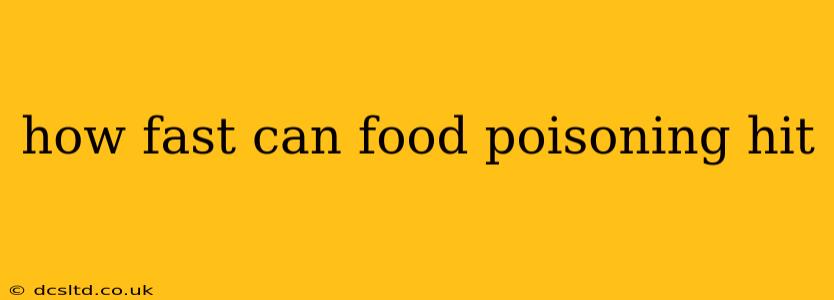How Fast Can Food Poisoning Hit? A Comprehensive Guide to Symptoms and Onset Times
Food poisoning, also known as foodborne illness, is a distressing experience that can range from mild discomfort to severe illness. The biggest question on many people's minds is: how quickly will symptoms appear after consuming contaminated food? The answer isn't a simple one, as the incubation period – the time between eating contaminated food and experiencing symptoms – varies greatly depending on several factors. This guide will explore the speed at which food poisoning can strike and delve into the specifics influencing onset time.
Understanding the Incubation Period
The incubation period for food poisoning can range from a few hours to several days, even weeks in some cases. This significant variation is primarily determined by the type of bacteria, virus, or parasite responsible for the contamination, as well as the amount of the pathogen ingested and the individual's immune system.
Common Foodborne Illnesses and Their Incubation Periods:
It's crucial to understand that different pathogens have different incubation periods. Here's a breakdown of some common culprits:
-
Staphylococcus aureus (Staph): This bacterium produces a toxin that causes rapid onset symptoms, typically within 30 minutes to 6 hours. The illness is characterized by vomiting, diarrhea, and stomach cramps.
-
Salmonella: Symptoms usually appear between 6 to 72 hours after consuming contaminated food. These can include diarrhea, fever, abdominal cramps, and nausea.
-
Campylobacter: This is a common cause of bacterial diarrhea. Symptoms usually begin 2 to 5 days after exposure, lasting for several days.
-
E. coli: Incubation periods for E. coli infections vary widely, ranging from 1 to 10 days, but symptoms often appear within 3 to 4 days. This can range from mild diarrhea to severe, bloody diarrhea, and even kidney failure in certain cases.
-
Norovirus: This highly contagious virus is often associated with outbreaks in restaurants or cruise ships. Symptoms, including vomiting and diarrhea, generally begin 12 to 48 hours after infection.
-
Clostridium botulinum (Botulism): This is a rare but serious form of food poisoning. Symptoms, including blurred vision, difficulty swallowing, muscle weakness, and paralysis, can appear anywhere from 6 hours to 10 days, depending on the form of botulism. This requires immediate medical attention.
What Factors Influence How Quickly Food Poisoning Symptoms Appear?
Several factors can impact the onset time of food poisoning symptoms:
-
Type of Pathogen: As mentioned above, different pathogens have vastly different incubation periods.
-
Amount of Pathogen Ingested: A larger amount of contaminated food will likely result in a quicker onset of symptoms.
-
Individual's Immune System: A person with a weakened immune system might experience symptoms sooner and more severely.
-
Strain of Bacteria or Virus: Even within a single species of bacteria or virus, different strains may have different virulence (ability to cause disease) and incubation times.
-
Food Preparation and Handling: Improper food handling can significantly affect the level of contamination and the speed at which symptoms develop.
How Long Do Food Poisoning Symptoms Last?
The duration of symptoms also varies greatly depending on the causative agent and individual factors. Most cases resolve within a few days, but severe infections may require medical intervention and could last much longer.
What are the Symptoms of Food Poisoning?
Common symptoms of food poisoning include:
- Nausea
- Vomiting
- Diarrhea
- Stomach cramps
- Fever
- Headache
- Muscle aches
When Should I Seek Medical Attention?
While many cases of food poisoning resolve on their own, it's essential to seek medical attention if you experience:
- Severe dehydration
- Bloody diarrhea
- High fever
- Severe abdominal pain
- Signs of neurological symptoms (e.g., weakness, paralysis)
- Symptoms that last longer than a few days
This information is for general knowledge and does not constitute medical advice. If you suspect you have food poisoning, consult a healthcare professional for diagnosis and treatment. Remember that practicing safe food handling techniques is crucial to preventing foodborne illnesses.
